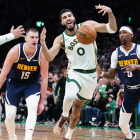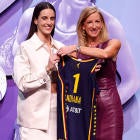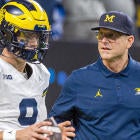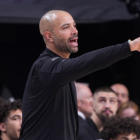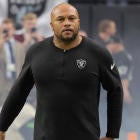
The Heisman universe is starting to get interesting. Here's a look at the second weekend of college football and what it means for the Heisman race:
1. The Fall of Montee Ball and what it means for Wisconsin
I often hear people say that the Heisman Trophy is irrelevant. I understand the sentiment. After all, it's a team sport and the Heisman honors individual achievement. On Saturday night I tweeted out a link to my analysis of Montee Ball's fading Heisman hopes and a Wisconsin fan responded "I think team is in more trouble than worrying about hardware. OC, QB and OL need to get on the same page."
What people sometimes forget is that individual success, or lack of it, often points to larger issues about a team. Does anyone think that if Wisconsin's offensive coordinator, quarterback and offensive line really were on the same page that Ball would be struggling the way he is? It's not like he turned into a pedestrian talent overnight. And if Ball was tearing it up, there wouldn't be all this complaining about the Badger offense and line coach Mike Markuson would still be employed. Ball's declining production is merely a canary in a coal mine.
The ability of a program to mount a serious Heisman campaign is often an indicator (sometimes leading, sometimes lagging) of its overall health. There is a symbiotic relationship between team success and individual achievement. If Ball was a serious Heisman contender, Wisconsin would be a much better team and if Wisconsin was a better team, Ball would be a serious Heisman contender. The individual elevates the team and the team elevates the individual. Paul Hornung and Troy Davis aside, it's always been like that.
2. How can Collin Klein become a factor?
A Heisman candidate is not unlike a pop song. If you want that song to be a hit, it's got to have a hook.
For Kansas State quarterback Collin Klein to compete for the Heisman, he'll need one, too.
If the Wildcats were bound for a dream season, things would probably take care of themselves. And maybe they are...who am I to say otherwise? But how does a player from a team not in the national title race make a run at the trophy? Well, he's usually got to accomplish something that never, or rarely, gets accomplished. Maybe it's a unique stat, or maybe its an NCAA record, or maybe he helps upset some elite teams in dramatic fashion.
I think Klein's best route to the Heisman is to become the NCAA's first 25/25 player, meaning 25 touchdown passes and 25 touchdown rushes. He rushed for 27 touchdowns last season and threw for 13, but I think he has a chance to signficantly improve his passing production this season. He's off to a good start, with three touchdown passes and three rushing touchdowns in his first two games. It helps that he's an absolute beast down by the goal line.
If Klein rises to the challenge and gets to 25/25, he'll be the first Wildcat to leave Manhattan for Manhattan in early December.
3. Why not A.J. McCarron?
If not for the narrowest win in Heisman history in 2009, the Crimson Tide would still be seeking that elusive first trophy. It's a curiosity that a team so rich in tradition has just one Heisman.
But could junior quarterback AJ McCarron be on the verge of making his own run at the trophy? After all, he is the efficient field general for the nation's No. 1 team. He was the MVP of the BCS title game earlier this year and he's been near-perfect so far this season, with 418 yards, six touchdown passes and no interceptions.
To do so, he'll have to buck history. I don't mean Heisman history.
More like Crimson Tide history.
For all the brilliant quarterbacks who have come through the school, not one of them has thrown for over 3,000 yards in a season. For all the national championship quarterbacks, not one has surpassed 20 touchdown tosses in a season.
You can't win the Heisman in this day and age throwing for 2,987 yards and 20 touchdowns, as Greg McElroy did in 2010 for the Tide, no matter how many games your team wins. Twenty-five years ago, perhaps, but not today.
So this is McCarron's challenge. He's on pace for 2,834 passing yards and 39 touchdowns this year. Can he keep the touchdown pace going and increase his yardage? Can he convincingly shatter Bama's all-time single-season passing marks? If he does that--and nothing less--then he'll have a chance to be in the Heisman conversation at the season's end.
I just don't think he can win. Not with quarterbacks like Matt Barkley and Geno Smith in the race. It might take a more transcendant talent--and a more pass-happy offensive philosophy--for an Alabama quarterback to finally win a Heisman.
4. The appeal of Jarvis Jones
Every year there is an early-season Heisman boomlet for a defender or a non-skill-position offensive player. Sometimes those players end up influencing the race, as Ndamukong Suh did in 2009 and Tyrann Mathieu did in 2011.
Most of the time, though, I come closer to winning the Heisman than these guys do.
This year's defensive flavor of the day is Georgia linebacker Jarvis Jones. He's a returning All-American for the Bulldogs and he got tongues wagging after his performance against Missouri on Saturday night. Jones had two sacks, two forced fumbles, an interception, nine tackles and five pressures in Georgia's 41-20 win.
That got the Heisman talk going, but I doubt it's going to go very far.
Don't get me wrong. Jones is a great player. He's going to get some Heisman votes.
But defensive players just don't win the Heisman.
It's not because voters are biased against defenders. It's because they do what everyone else does when trying to figure out the best player: They look at numbers. And that's where offense wins out.
Offense is driven by statistics. There are tons of ways to quantify a quarterback's output. Not so for defensive players. How do we measure Jones' dominance? Through sacks and tackles? Once we do so, how do we compare it to the other candidates? Why is Jones getting buzz as a Heisman candidate and not FSU defensive end Bjoern Werner, who leads the nation in sacks? Or why not safety Ed Reynolds of Stanford, who already has three interceptions, one of which he returned for a touchdown?
The proper reply to those questions is that while we can't necessarily quantify it on paper, Jones is just better. Though it may be an accurate sentiment, it's not going to be enough for Heisman voters to go on.
This isn't how I want things to be, it's just reality. If any Bulldog wins the Heisman, it's going to be Aaron Murray.
HEISMAN PLAYER OF THE WEEK -- Johnathan Franklin
What to make of a running back who has 431 yards and three touchdowns in his first two games (one of them against a ranked team) and leads the nation in rushing while averaging 10.5 yards per carry? In almost every case, I'd call him a Heisman candidate.
In this case--at least for now--let's call him my Heisman Player of the Week. UCLA senior Johnathan Franklin earns the honors after rushing for 217 yards on 26 carries and catching three passes for 59 yards (and a score) in the Bruins' 36-30 win over Nebraska.
Given UCLA's recent history, perhaps I can be forgiven for being a bit slow to jump on the Franklin-for-Heisman bandwagon. I think he's a really good back and he's certainly blossomed in UCLA's new offense directed by Noel Mazzone. And the way the schedule sets up, with the likes of Houston and Colorado on tap within the span of the next three weeks, he should have several opportunities to pile up the yardage. Looking even further ahead at the schedule, he'll close things out with USC and Stanford in games that a lot of people will be watching, especially if the Bruins are ranked and in contention for a decent bowl.
But I think the best early-season test for Franklin will come two Saturdays from now when the Bruins host Oregon State. If Franklin can glide by a Beaver defense that made mincemeat of Montee Ball, he'll give a lot of Heisman voters something to think about.
This one included.











